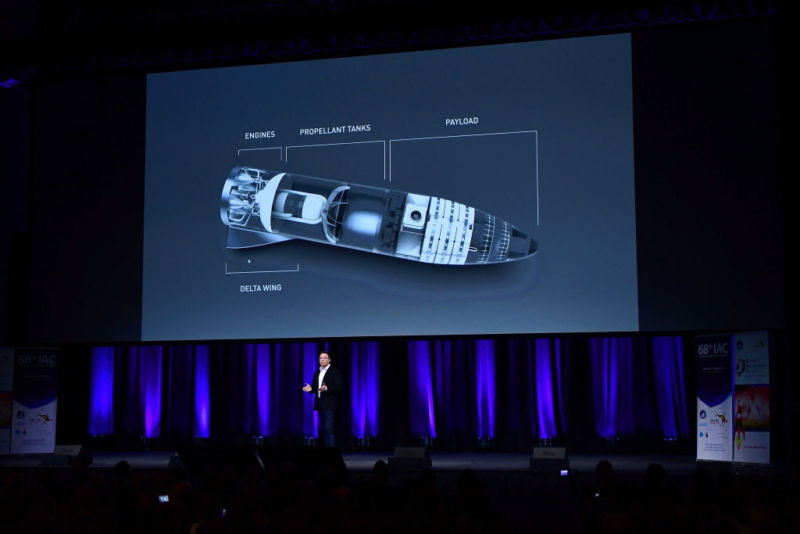
No one can deny that SpaceX founder Elon Musk has thought a lot about how to transport humans safely to Mars with his Big Falcon Rocket. But when it comes to Musk's highly ambitious plans to settle Mars in the coming decades, some critics say Musk hasn't paid enough attention to what people will do once they get there.
However, SpaceX may be getting more serious about preparing for human landings on Mars, both in terms of how to keep people alive as well as to provide them with something meaningful to do. According to private invitations seen by Ars, the company will host a "Mars Workshop" on Tuesday and Wednesday this week at the University of Colorado Boulder. Although the company would not comment directly, a SpaceX official confirmed the event and said the company regularly meets with a variety of experts concerning its missions to Mars.
This appears to be the first meeting of such magnitude, however, with nearly 60 key scientists and engineers from industry, academia, and government attending the workshop, including a handful of leaders from NASA's Mars exploration program. The invitation for the inaugural Mars meeting encourages participants to contribute to "active discussions regarding what will be needed to make such missions happen." Attendees are being asked to not publicize the workshop or their attendance.
Life on Mars
The meeting is expected to include an overview of the spaceflight capabilities that SpaceX is developing with the Big Falcon rocket and spaceship, which Musk has previously outlined at length during international aerospace meetings in 2016 and 2017. Discussion topics will focus on how best to support hundreds of humans living on Mars, such as accessing natural resources there that will lead to a sustainable outpost.
Through this meeting, SpaceX hopes to engage more deeply with both NASA and the scientific community that have studied these questions in depth for decades—but have regularly been frustrated by the space agency's lack of progress toward getting people to Mars. One scientist attending the meeting told Ars, "I have some confidence that SpaceX will eventually achieve its goal of getting to Mars, and this feels like an exciting opportunity to be part of that story and to influence the future of humans on the Red Planet."
The workshop features three co-hosts: Paul Wooster, who is SpaceX's principal Mars development engineer; Margarita Marinova, senior Mars development engineer; and Bobby Braun, dean of the College of Engineering & Applied Science at CU Boulder. Braun, a former chief technologist for NASA, has worked with SpaceX on projects in the past.
In response to a query from Ars, Braun released the following statement about the conference: "CU Boulder and its Laboratory for Atmospheric and Space Physics are proud to host a broad swath of representatives this week from across academia, government, and industry in a discussion of Mars surface exploration technologies," he said. "As the nation's hub for aerospace innovation, hosting meetings with an industry partner like SpaceX is part of what we do."
SpaceX and NASA
Braun, who became a dean at CU Boulder in 2017, has elevated the university's aerospace profile, and the meeting represents a coup as the university nears completion of a $101 million aerospace building. That facility will include a mission control for experimentation on the International Space Station, a Dream Chaser simulator, and an indoor flight environment for drones and other flying vehicles without humans on board.
"From flying payloads to the International Space Station with NASA to partnering with Colorado aerospace giants like Ball Aerospace, United Launch Alliance, Sierra Nevada, DigitalGlobe, and Lockheed Martin in research and workforce development, to developing and operating next-generation space science payloads and missions across the Solar System—CU Boulder is advancing innovation across the aerospace sector," Braun said.
It seems noteworthy that several NASA scientists who study the Red Planet (and the potential for human landings) will attend the workshop. Although NASA and SpaceX have an excellent relationship through the commercial crew and cargo program to fly provisions and people to the International Space Station, there is some overlap and potential competition in deep space.
Both NASA, with public money, and SpaceX, through private investment, are developing very large rockets that will enable humans to fly into deep space. Both NASA and SpaceX ultimately want to send humans to Mars. A workshop like this could ultimately plant seeds that result in collaboration rather than competition in the years to come. That seems especially possible given the Trump administration's stated desire for NASA to work closely with commercial space companies like SpaceX and its innovative technologies, such as reusable launch vehicles.
reader comments
209